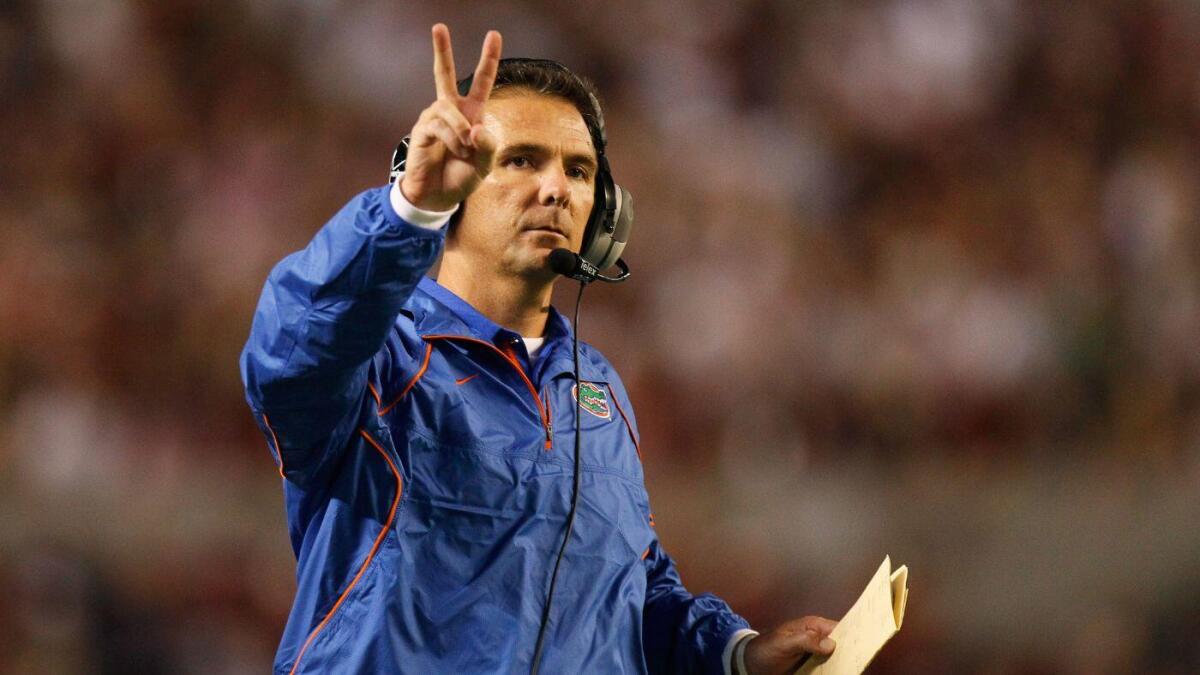Urban Meyer’s era with the Florida Gators stands as a landmark in college football history, characterized by extraordinary success tempered with profound personal and organizational challenges. His tenure from 2005 to 2010 embodies a complex blend of triumph, strain, and legacy that continues to provoke discussion and reflection within the sporting community.
Achieving Peak Performance: The Athletic Triumphs
Meyer’s coaching career at Florida represents a period of remarkable achievement. Over six seasons, his leadership yielded an impressive 65-15 record and two national championships, milestones that reinstated the Gators as a dominant force in college football. Meyer’s coaching acumen was evident in his ability to optimize talent—most famously through quarterback Tim Tebow, whose emergence as a leader and athlete became synonymous with the team’s identity during this golden era.
The strategic innovations Meyer introduced—ranging from rigorous training techniques to adaptive game-day strategies—redefined Florida’s football program. Under his guidance, the Gators evolved into a powerhouse, their successes amplified by Meyer’s meticulous preparation and capacity to motivate his staff and players alike. This era fortified a winning culture and rejuvenated fan enthusiasm, embedding lasting pride in the Gator Nation’s fabric.
The Weight of Pressure: Health and Emotional Struggles
Behind the veneer of success lurked significant personal hardship for Meyer, particularly concerning his physical and emotional health. By 2010, the relentless demands of coaching manifested in serious health issues, including notable weight loss and chronic chest pains. These conditions underscored the immense stress coaching at such an elite level can generate. Meyer’s ordeal is illustrative of the hidden toll that high-stakes sports environments exact on leaders, often pushing individuals to suppress symptoms to maintain appearances of strength and control.
His decision to resign, driven not by a waning competitive spirit but by urgent health concerns, marked a profound turning point. Meyer’s candid acknowledgment of his vulnerability disrupts the traditional narrative of invincibility often associated with top-tier coaches. This choice invites a broader conversation about the sustainability of coaching careers and the importance of prioritizing well-being amid relentless pressure.
Navigating Legacy: Success Shadowed by Controversy
Meyer’s legacy at Florida is far from unblemished, presenting a dual-edged narrative. While his achievements set new standards and generated accolades that many coaches covet, the circumstances surrounding his departure have sparked debate. Some former players and critics suggest that the intense, sometimes “brutal” coaching style Meyer employed may have contributed to unrest within the team and lingering instability following his exit.
The aftermath of Meyer’s resignation saw the Florida program struggle with inconsistency and diminished performance, indicating the profound influence of his absence. This period of volatility invites scrutiny of the leadership environment Meyer cultivated and how its intensity affected not only team results but also interpersonal dynamics. Documentaries such as Netflix’s “Untold: Swamp Kings” delve into these complexities, illustrating the fine line between effective discipline and the human costs of pressure-cooker coaching styles.
Emotional Resonance and Enduring Bonds
Reflection on his Florida tenure reveals Meyer as a figure deeply connected to the program, marked by both pride and regret. The emotional struggle accompanying his departure—described by Meyer as “heartbreaking”—reveals the often unspoken human dimension of coaching, where professional identity is intertwined with personal sacrifice. Despite stepping away, Meyer has maintained ties with the Gator community, underscoring the lasting relationships forged during his tenure.
Moreover, his openness about mental health challenges signals a progressive shift toward acknowledging the psychological demands inherent in high-level sports leadership. This transparency contributes to an evolving dialogue about wellness and resilience in environments traditionally dominated by toughness and stoicism.
Conclusion: A Legacy of Complex Triumph and Human Cost
Urban Meyer’s time with the Florida Gators represents a multifaceted legacy that transcends mere wins and losses. His remarkable accomplishments on the field are inseparable from the personal and organizational challenges that shaped his journey. Meyer’s story highlights the intricate balance between professional ambition, the toll of leadership, and the necessity of self-care.
The Gators’ climb to prominence under his guidance remains a testament to his coaching genius, yet it is equally important to acknowledge the vulnerabilities and controversies that accompanied this success. This legacy serves as a compelling case study in the intersections of achievement, health, and leadership impact—an enduring reminder that behind every scoreboard lies a deeper human narrative.











